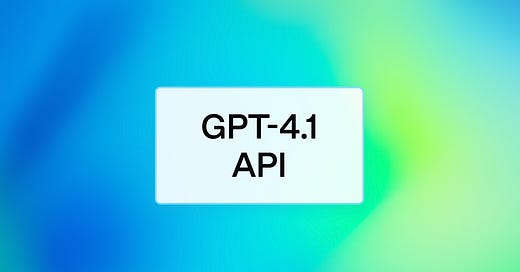OpenAI Releases GPT-4.1 Models for Coding
How the new models position the company to compete for developers
Welcome to another edition of AI 101, where every Wednesday we bring you the biggest AI update of the week.
This Week’s Update: OpenAI Introduces GPT-4.1 in the API
On April 14th, OpenAI launched GPT-4.1. The new series of models includes GPT-4.1 and two smaller models, 4.1 mini and 4.1 nano, that offer strong performance at a lower cost and higher speeds. The GPTs outperform GPT-4o and 4o mini across the board, but their largest improvements are in coding and instruction following. The new models also have larger context windows of up to 1 million tokens, allowing them to retain nearly 750,000 words in memory when responding to queries.
GPT-4.1 outperformed 4o, 4.5, and o1 on the SWE-bench Verified accuracy benchmark, which measures software engineering skills.
Importantly, GPT-4.1 was created for OpenAI’s API and not ChatGPT. The new models were made in collaboration with developers and optimized for real-world use. The emphasis on software engineering capabilities positions OpenAI to compete with sophisticated programming models like Google’s Gemini 2.5 Pro and Anthropic’s Claude 3.7 Sonnet.
Why This Is Important
By offering these models exclusively through its API instead of ChatGPT, OpenAI signals its commitment to developers and enterprise clients. For individual users, most top models feel similar, but for developers, small differences in performance can aggregate across tools and systems. There is a growing divide between OpenAI’s API, which offers faster and cheaper models like GPT-4.1, and ChatGPT, which gives users access to more powerful models like GPT-4.5 and tools like Deep Research. This presents a challenge for companies as employees using ChatGPT may have access to more advanced AI than what IT teams can provide through in-house models that rely on the API.
Quick Hits:
On Monday, Nvidia announced a $500 billion commitment to build AI infrastructure in the U.S. over the next four years after the Trump administration announced tariffs on semiconductor imports.
Researchers at Dartmouth conducted the first clinical trial of an AI-powered therapist chatbot. Chatting with the bot for eight weeks meaningfully reduced psychological symptoms among users.





